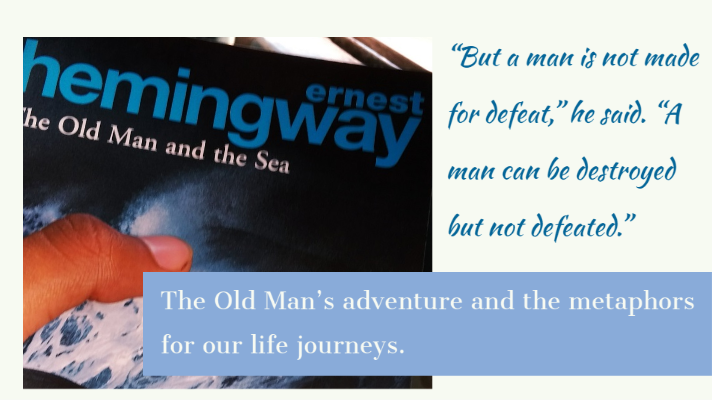“But man is not made for defeat,” he said. “A man can be destroyed but not defeated.”
— Ernest Hemingway, The Old Man and the Sea
Destruction is temporary. Defeat is a permanent state of mind. Ernest Hemingway wrote The Old Man and the Sea towards the end of his career. The novella also won the author a Pulitzer price in literature. I came across the quoted excerpt for once more in a recent period during my interview for the SBI Youth For India fellowship. As for the interview, it was a really pleasant experience regardless of the final outcome that is due late August. We had some lively discussions on the recently approved National Education Policy 2020, on my favorite books and movies, on media and sensationalism, and my motivations to join a rural development program.
The interview did, however, end on a bit awkward note with me sobbing a little to the end, following which, one of the panel members (there were four of them) read me this small excerpt to boost my strength. An astonishing fact is that I loved the novella (The Old Man and the Sea) but never understood it. I liked it for its lucid sentences and for Santiago’s sea adventure (Santiago is the central character and the Old Man in the book). Somehow, I missed the metaphor of Santiago’s journey to our own journeys in this world. The author, apparently, lost to his depressions and died in the year 1961. I was a bit sad to learn about his fate but would refrain from making comments or giving a graphical account of the same.
FYI, SBI Youth For India is…
SBI Youth For India is a 13-month rural fellowship opportunity for young people (including freshers) to develop, lead, and engage in rural development projects. It’s an initiative under the SBI Foundation, the CSR arm of the State Bank of India. Registration begins in the month of October. You will find these opportunities in the ‘Updates’ section on Mahtab Journal. You can also sign up to receive these updates right into your inbox (E-mail or Whatsapp).
“A Man Can Be Destroyed But Not Defeated.” – A Reflection on Santiago’s Adventure
The story goes… Santiago had gone without catching a single fish for eighty-four days. In his younger days, he was excellent at catching fishes of all sizes and shapes, but now, it seemed as if he had worn out his luck and skills with age. It remained, however, but only a temporary state of destruction. The old man would not accept defeat.
On the eighty-fifth day, Santiago leaves the shallow water for big fishes in the deep sea. The old man catches a big marlin soon into his adventure but ends up spending his next couple of days in fighting the sharks and the harsh sea. Santiago is a crazy old man that talks to himself, a lot. You will also enjoy the manner in which the old man addresses the marlin (with respect) and pities the sharks and the sea. But, do remember to also take note of the metaphors that I had missed on my first read. Do leave your observations and comments in the comment section below and we can have a lively discussion on the old man (and of course, the sea).
The Old Man and the Sea is another excellent classic that you can purchase for a dirt price. It’s only a hundred pages and you can easily read it in one go. Purchase your paperback copy of the novella on Amazon. Or, go for a Kindle edition for only ₹19.
Dirt priced classics are love, right? Here’s another dirt-priced book, read our review of Rabindranath Tagore’ Nationalism.
Interested in how the English language came to be as it is today, we have a nonfiction recommendation for you. Read our review of Word by Word: The Secret Life of Dictionaries by Kory Stamper.

